
-Quick Report for International Symposium-
5/13/2008
2008 International Symposium on Realizing a Universal Society
-Aiming a Society of Coexistence and Mutual Support-
Monday, March 24th, 2008
Ho-oh Hall, Hotell New Otani Tokyo
(MC) Thank you for waiting. And now we would like to start the International Symposium on Realizing a Universal Society. At the opening of the session, on behalf of the sponsor, we would like to ask Nami Takenaka to say a few words of welcome to all of you, representing the hosting organization.
Opening Address of the Host
Nami Takenaka (Chairperson, Prop Station)
Good evening, ladies and gentlemen. Thank you very much for taking time out of your busy schedules to be here despite the rain, although it's a spring rain. I am very happy to see so many of you who have come all this way to our symposium.
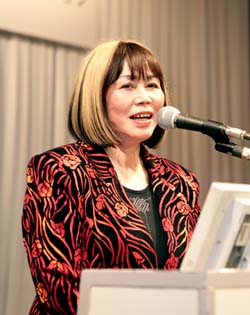 Prop station's mission is to ensure that people will be able to exercise their abilities, regardless of the level of their disabilities. So we can make Japan a country where everybody is happy and where everybody can be energetic and revitalized. So I have been working in this field for many years, I have seen many people, and have invited many of my friends here. One such example is Dinah, she is the representative of the people I had contact with in the past. Ms Dinah Cohen, is the Director of CAP and regardless of their level of disability, all the people working for the Department of Defense are able to exercise their ability. They are able to become the leader or the very driving force of the enterprises. This is the kind of system that is taking place in the United States.
I was very surprised to learn of the existence of CAP within the DoD and my first question was, why in DoD? Well actually, I did not say that in English, I used the interpreter and I asked this question because I was surprised to see CAP within the DoD. And she said, we have to start national security with making sure that everybody, everyone of the citizens can be proud of himself or herself. It is not the paternalistic kind of measures, but rather we have to make sure everybody can exercise their ability regardless of their disability. They have the capacity and the ability, but are not given the help to allow them to exercise their strengths. That was the kind of driving force behind me when I established Prop Station, and I was very much impressed when I was listening to Ms Dinah Cohen speak about this issue.
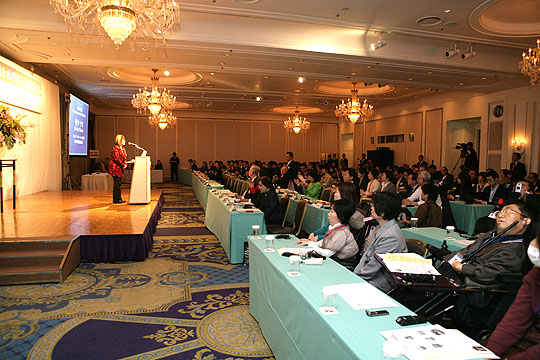
I decided to have a close contact with these people to make sure that this kind of situation be brought to Japan as well. Our hopes are that we can look at the ability of these people, rather than the negative aspects of their disability. We use the term challenged to mean people with disabilities and many people have been very active through the framework given by Prop Station. Please take a look at the picture cards included in the package. Ms Rie Kubo is the illustrator of these pictures and she has been really active in this field. She studied to become an artist and we would like you to take a look at these pictures.
She is here in this same room and I would like to introduce her. Rie Kubo, can you move a little bit so that people can see you? Thank you. So this is a precious opportunity to hear from her. Now, Rie Kubo, if you would say a few words please?
(Kubo) Nice to see you. My name is Rie Kubo. I am on care for 24 hours a day so I am severely disabled, but through the help provided by Prop Station I am able to draw these pictures. I ask for your continued help and support. Thank you.
(Takenaka) Do not believe her. We are not providing any help, but our key or buzz phrase is we do not need any money, we need jobs. This may be a very provocative buzz phrase, but still I think this is a very good example of the attitude needed in society. So we would like you to provide assistance and provide employment to these people as in the case of Ms. Kubo Rie. So we will listen to the presentation by Ms Dinah Cohen and we'll also have a panel discussion among the people who are exerting their best efforts in realizing a universal society. We would like you to listen to everything here to learn something from this symposium. Thank you very much for your support through the entire session.
Opening Remarks
Mr. Yasuo Fukuda (The Prime Minister)
Mr. John Thomas Schieffer (The U.S. Ambassador to Japan)
Mr. Akihiro Ota (Chief Representative of Komeito)
Mr. Yukio Hatoyama (Secretary General of the Democratic Party of Japan)
(Takenaka) That was my part as the representative organizer. From here on, I will serve as the moderator. I would like to move on to the messages from the invited guests. Prime Minister Fukuda was supposed to come here, but unfortunately due to other engagements he could not make it to this venue, and we have Ms. Hamayotsu who has been active in this segment and together we actually visited the Prime Minister at his official residence the other day. So let us look at the video message from the Prime Minister.
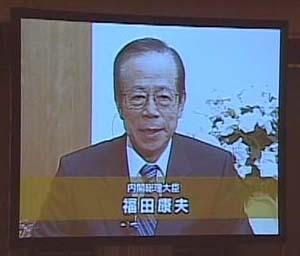 (Fukuda) Good afternoon, ladies and gentlemen. My name is Yasuo Fukuda. To help us achieve our goals of realizing a universal society we have with us Ms. Dinah Cohen from CAP of DoD. I congratulate you all on holding this International Symposium on Universal Society. We have the aging and birth rate decline issue and we would like to form a society where everybody participates regardless of gender or age or whether one has a disability or not. A small step is very important. For instance, mothers and fathers that are fostering children can be helped by the elderly in the community so that they will overcome not just the issues that they face, but also share the joy of raising children.
Also in the public sector there are challenged people who want to work. We would like to accommodate them and the people surrounding them will also be encouraged by seeing these challenged people working with joy. And the people who are not necessarily physically challenged can remember what is so important about working, go back to the basics. So I hope this will encourage everybody to rejuvenate the society as a whole, challenge, yes.
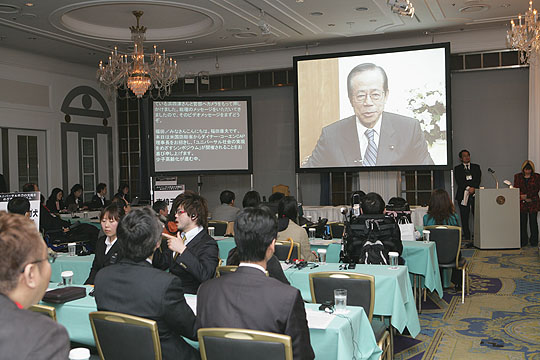
(Takenaka) So that was a message from our Prime Minister Fukuda. Next we would like to ask Mr. Schieffer, Ambassador from the United States to Japan, to give his very hot remark.
(Schieffer) Thank you Takenaka-san. It is a true honor for me to be here with distinguished members of the Diet and people that are interested in one of the most important subjects that any of us deal with in the world today. The issue of trying to create opportunity for those who may have been challenged is one that warms your heart. When I first received the invitation to come here to speak to you today, I accepted it because I wanted to share with you my personal experience in dealing with this issue.
I was President of the Texas Rangers baseball team in the early 1990s at a time when we were building a new ballpark for the Rangers. I was put in-charge of that facility and it was a quite large facility. It is 400,000 square feet and I think that is about 130,000 square meters. So it was a pretty substantial undertaking. It was the first public building of that size that was built in the United States after the passage of what we call the Americans with Disabilities Act. The Americans with Disability Act had some very strict guidelines that were to be used in the construction of new facilities.
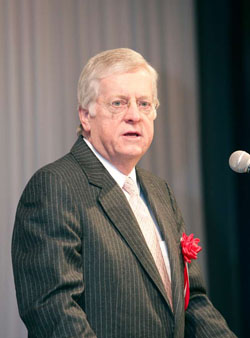 Now because we were the first large facility to be built in the country, many people looked to us. There were times when we would meet with the contractors and architects, and we would talk about how difficult it was to build that building under these new standards and how many changes had to be made in the construction process in order to accommodate those changes. I have to be honest with you, there were times when we did not know whether it was really needed or not, or whether it was really necessary or not, but then the building was finally built.
We invited a group of challenged individuals to visit, because we wanted them to preview the facility before it was open to the public. We had people who were blind. We had people who were deaf. We had people who were on crutches. And we had people that were in wheelchairs. It was quite a large group. It was about 15 or 20 challenged individuals. We asked them to come to the ballpark and we began to show them all of the changes that we had made to accommodate people who were challenged.
We showed them the concession counters that were lower, so that someone that was in a wheelchair could role up to that concession stand and be able to order something as anyone else is able to order something at the concession stand. And then we showed them the seating arrangement. Because we discovered in the process that often in a family; it is not a two wheelchair family or a three wheelchair family, it is a one wheelchair family. So what we realized that in order for people to watch a baseball game as a family, we had to have regular seating next to seating for people in wheelchairs. So we devised an innovative system in which we could change out the seats and put in more spaces for wheelchair or more spaces for regular seating depending upon the family that was involved.
As we were explaining a series of things, I looked over at some of the people that had come there to see it. Their tears were streaming down their face. I said, "What is wrong? What have we done wrong?" They said, "Oh no. It is not what you have done wrong. It is what you have done the right. For the first time in our lives we are going to be able to come to a baseball game as other people do and enjoy it as other people do."Now what happened after that, and it was such a touching moment for me; it is hard for me to tell you about it without becoming emotional again myself.
But what followed that was truly remarkable, because the number of people that had challenged coming to the ball games before, for instance the number of people in wheelchairs, and then the number of people that came to that facility after, they moved into that new facility increased by five fold. What we discovered in the process was that there was a huge part of the population that wanted to come to the ball games, to buy tickets, to buy concessions, to be a part of the community, and to enjoy being in a ball game, and the facility that we had was keeping them from doing that.
What I realized was that it is good business to change, it is good business to increase your market, to provide facilities that people that have not been able to use those facilities in the past or able to use. It is good business, but more than anything else it is the right thing to do. It makes you feel good that you are able to give people something that they have not been able to enjoy in the past. We will increasingly become aware of how important it is to allow everyone to participate in society.
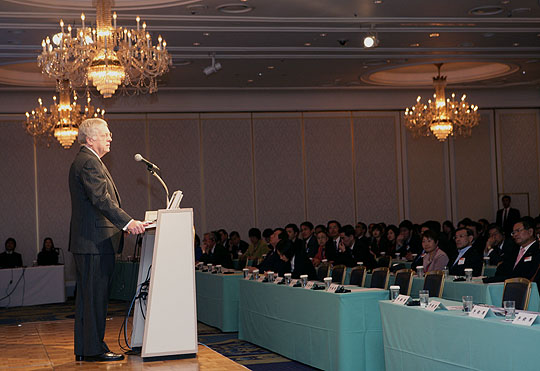
One of the great things that has happened in the world of technology is that technology now exists that can bring more and more people into the work place, that can give more and more people the opportunity to make a meaningful contribution in society. What we have to do is to open our minds and to understand the change that has occurred and how much it can benefit those who have been challenged in the past and how much it can benefit those of us who have been blessed with few challenges in our lives.
It is this bringing together that will make us a better society and a better world. I am delighted to be here with you to begin this symposium. And I encourage you to listen and to think, and to advocate for a different society than we have had in the years past. Thank you very much.
(Takenaka) Thank you very much Ambassador Schieffer for your very strong message based on your own personal experience. Next on behalf of the New Komeito party, we have with us Mr. Akihiro Ota, the chief representative. Due to his schedule Ms. Hamayotsu was supposed to give a message on his behalf, but Mr. Ota himself has come to this venue.
(Ota) On the occasion of the International Symposium on Realizing a Universal Society it is a great honor to welcome Ms. Dinah Cohen as well as Ambassador Schieffer. I thank your presence and also the presence of everyone gathered here, and I would like to congratulate you for the successful holding of the symposium.
Ms. Hamayotsu is not just representing our party, but very active in the political arena as a whole. Since a few years ago, she has been very active in leading this project team to realize the universal society and I am also a member of that team, but I am not a frequent participant in the meetings. So I would like to take this opportunity to apologize for that, but truly however, I strongly feel that we really have to create such a universal society. It is high time that we did that.
Thinking about the 20th Century, the first half of the century was always fighting over territories. So that was a century of fighting a war and in the later half we also fought to gain wealth over other countries, other people. Now our party and our party supporters strongly believe that this 21st Century has to be a humanitarian society and human rights is very, very important for this society. Compassion and care for others needs to be really deep and very broad. We need to have that kind of behavior. And someone said that broader than ocean is the blue sky, but even broader is and deeper is the human mind and heart and feelings of people.
I think we need to become a society where people can really live up to that promise. I do not know the details but in my view, human rights should not be difficult to define. Human rights should allow everyone to think that life is worth living, allowing everyone to be able to feel, that is what we mean by realizing human rights. We are of course, thinking about the challenged people and we have tried to envision a society without any barriers. In other words, no steps in the society, in the outdoors, and we want to also create a society where everybody can take part in. It is not just elimination of prejudice or discrimination. I had many opportunities to meet with the challenged people. And of course, the parents would have worried a lot about the future of the children, but despite the difficulties I am sure that parents have learned a lot and the parents now think that their children are not to be the source of worries, but rather a source of some thing that gives them hope and brightness.
So it is really not the source of worries, but now it is the source of encouragement. So with that in mind, we must remind ourselves of the fact that we are trying to make a society where everybody can be really active and very hopeful and very positive in their attitudes. I think it is very important that we create such a society, and I think this is a very epic symposium. Ms. Hamayotsu will elaborate on this later.
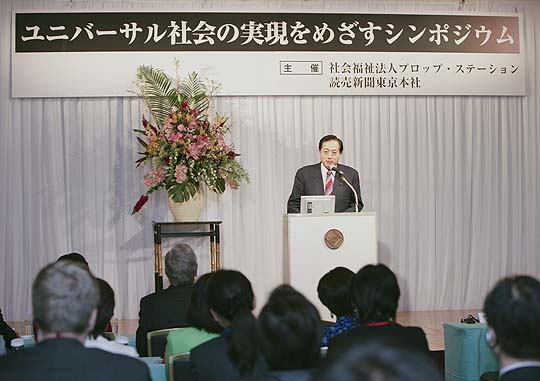
So maybe I did not need to come here in person, but I still thought this was a very important occasion to be here with you. So I am here, and I would like to once again congratulate you on the International Symposium. And I just wanted to express my deepest respect to the organizer and the symposium. Thank you very much.
(Takenaka) Thank you very much Mr. Ota. I really appreciate your words. Now Mr. Yukio Hatoyama is here and he is supposed to make the remark after listening to Dinah Cohen-san, but I understand that you are very busy. So after the completion of Ms. Dinah Cohen's remarks, he will have to leave due to time restraints. So we would like to ask him to take the floor and make a remark. Many people say that our National Diet is distorted, but in terms of the universal society it is not distorted at all. It is very much straightforward. He is from the Democratic Party of Japan.
(Hatoyama) Thank you very much. I think I have to leave in the midst of the presentation by Ms. Dinah Cohen. And I was worried about it. This was a very good remark by Takenaka-san. So I am very happy to be given this opportunity to speak in front of you at this point on behalf of the democratic party of Japan. And so, first and foremost, we have to realize that this is a symposium for the realization of a universal society. So we have to have this kind of bi-partisanship here in order to make sure that everybody in the society will make a contribution in this area, and I think it is quite natural to do that.
An especially important thing is the contribution made by Ms. Nami Takenaka and many of you have been very much intrigued and very much assimilated. So from the political position we are ready to make a further contribution. We have to provide encouragement to this kind of activity. So this has been the kind of mindset we had within this party, and then she approached us alongside with other parties to the effect that she is planning to think of the proposal for the Basic Law for the social security. And at this point I solemnly declare that the DPJ is more than ready to make a contribution here.
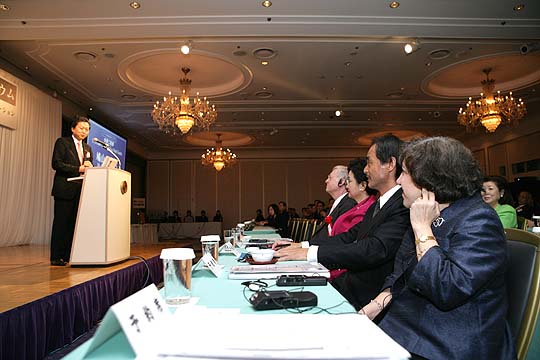
Mr. Schieffer, the Ambassador to Japan gave us a very impressive speech, especially about the ballpark. I think that was the first-ever approach in the entire world in establishing the ballpark in compliance with ADA. As he said, it makes sense in term of business, but the most important thing is that we did it because it was right thing to do and I totally agree with him. From that viewpoint we have to say that there are many thing that we have to do in order to catch up with the situation in the United States. In that respect we have to have a Japanese version of the ADA as soon as possible. We have to establish this kind of law and in order to do that we have to start with the Basic Law for social security. So my understanding here is that the establishment of the Basic Act towards social security would be the framework for the establishment of the Japanese version of ADA.
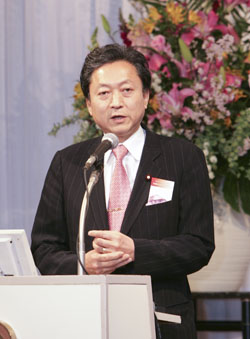 Mr. Fukuda used the phrase 'independence and coexistence', and I think I was the first to use that word. It is all right because the word is not protected by patent. It is more important for us to carry out the idea on the political side. I believe society of 'independence and coexistence' can also be called 'society of fraternalism'. I share the same understanding with Mr. Fukuda that each and everyone of us should be proud of ourselves. Each and everyone of us should live with dignity and we have to establish the society to enable that with the existence of dignity of each individual it is possible to go beyond what you are, to go beyond where you are. We are able to provide assistance to all people, including the challenged people. So young people and old people like everybody will be able to establish their ability and be able to exercise their ability to the fullest. As I said earlier, a society of love and friendship, that is the universal society that we are trying to establish.
So with these philosophies in mind, we sincerely hope that the Basic Law will be established based on these principles, and here again we would like to say that we have a tremendous dedication in supporting this activity. Well I am sure that you are more than ready to listen to the presentation by Ms. Dinah Cohen, so I apologize for taking so long, but still allow me to relate my commitment. I do hope that you understand that you are witnessing the very historical moment which will change the course of Japan. Thank you very much.
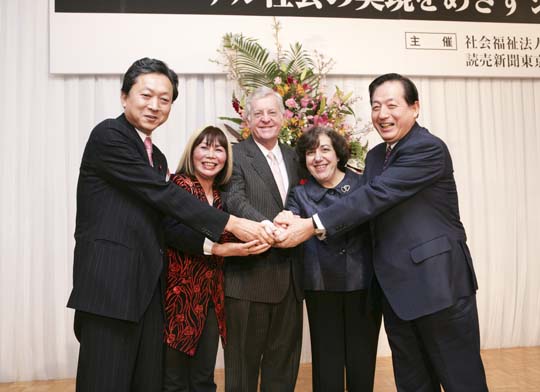
(Takenaka) Thank you very much. Could you stay on stage? Ms Cohen, can you go on stage as well as Ambassador Schieffer, Mr. Ota we would like to take a photograph together because this is a very good and rare opportunity. So please come on stage. Ambassador, you too please. And I will also join you.
-PHOTO TAKING-
(Takanaka) Thank you very much. What an important photograph, very rare, very valuable. Ladies and gentlemen, thank you so much for waiting. And next is the keynote speech by Ms. Dinah Cohen. Ms Cohen in her presentation will use power points. Now, in the handouts the translated Japanese version is included, A4-sized paper, three pages. She is going to use the English version, but if you can also refer to the Japanese translation that might help you. So without further ado, I would like to call upon Ms. Dinah Cohen.
Part1: Keynote Speech
"Leading the Way with Accommodations"
Ms. Dinah F.B. Cohen (Director, Computer/Electronic Accommodation Program (CAP),
The U.S. Department of Defense)
Good afternoon all. Thank you Nami, distinguished guests, it is a true honor and privilege to be with all of you tonight. I come with greetings from my leadership and hopes that we can all make a difference in our commitment to the employment and the advancement of people with disabilities.
Let me start off with a little bit of a background. CAP (Computer Electronic Accommodations Program) was established in 1990 as a centrally funded program in the Department of Defense to address the needs of our employees with disabilities. Based on our success, it was presented at that time to President Clinton that if he really wants to make a difference. He needs to have a centrally funded program for the entire federal government, and with that, my program expanded. So now I provide accommodations for federal employees with disabilities in Department of Defense and 65 other federal agencies, including my colleagues from the Department of State. I filled over 61,000 accommodations since our inception.
Sir, thank you for making that stadium accessible because only a few years ago we were able to bring back 30 of our most severely injured from Brooke Army Medical Center to a game to watch the Texas Ranger and it could not have been done if it was not accessible. Thank you, sir.
So, I have a mission. My mission is to provide the assistive technology and accommodations to ensure that people with disabilities have equal access to the information environment and opportunities in Department of Defense and throughout the federal government. Many people say that is odd. Why would the world's largest assistive technology program be in the Department of Defense? It seems like it would be at the Department of Health and Human Services or the Department of Education. The answer is simple. The Department of Defense is the leaders of technology. The Department of Defense needs the brightest and the best. The department of defense has a longstanding commitment to our war injured. So naturally, you put those elements together and you have the largest accommodations program in the world.
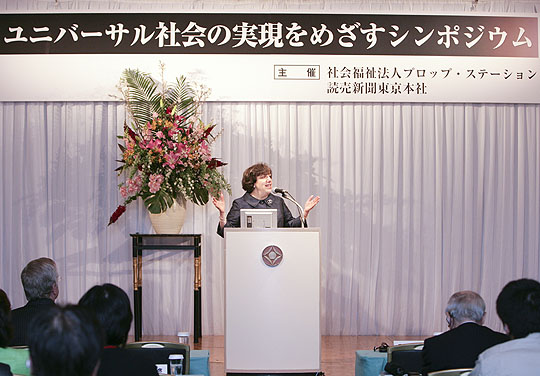
So what do we do? Our goal was to make sure that we get the people who need those tools so they can do their jobs. So through my budget I buy the accommodation, I buy it, I pay for it, I get it to the user, it is just that simple. We do not want to hear in Department of Defense that if someone does not have hands, they cannot use our computer. We do not want to hear that in the Department of Defense or anywhere in the federal government someone does not have eyes, they cannot use their computer or do their jobs. We want to level the playing field for all employees.
Some people do not know what they need. So we conduct the needs assessments and make sure that they know what is out there. We make sure that everything works together by providing integration and installation support because some of us work in a computer environment that uses one form of technology while some of us work in a different environment. We want to make sure that technology is working. We like to always train, like I am doing today, train people of the beauty and the benefits of employing people with disabilities and do a lot of disability management training, because some of us still do not get it. We do not realize the talent in this pool.
I hope, by the end of this presentation, you will know a little bit more. We like to make sure we are always there to support all these laws. You already heard the Ambassador talk about the Americans with Disabilities Act. In the federal government, there is an act that was even older than that called the Rehabilitation Act, because the federal government wants to be the model employer. So we had an act that was even older, making a difference is what it was all about.
I do all of this to assist in the recruitment, the placement, the promotion, and the retention of people with disabilities. And now, I have a newer customer. I have my returning wounded service members. Maybe you have not seen the news today, but let me share this news with you. It is a sad milestone. But we have had the milestone of losing 4,000 service members, but the number of injured is much larger and that is where I come in.
Let us talk about what is assistive technology. I bet there are some of you in the audience that say, I do not know what this woman is talking about. What is this stuff? This stuff is a fun stuff. This stuff lets you do things in this computer environment. So we have different computer input devices. For some of us who cannot use our hands well, we may have different keyboards, different pointing devices or at the high end we have voice recognition technology. And allow me to have a short demonstration of the power of this technology.
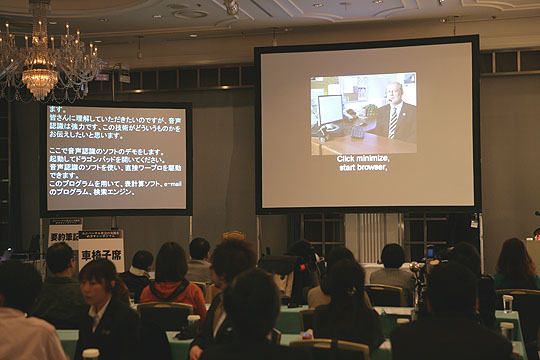
-Demonstration Started-
I am going to give you a demonstration of voice recognition software. Wake up, start Dragon Pad. As you can see, I can use voice recognition software to dictate directly into a word processor. I can also use this program to control the database, spread sheet, email program, or web browser. Click minimize, start browser, go to address bar, "www.navy.mil", go there, start scrolling down, speed up, stop scrolling, biographies, click close. Start Dragon Pad, period.
Voice recognition software can be a very appropriate accommodation for people with quadriplegia, cerebral palsy, ALS, or for wounded service members who have significant other extremity injuries. In some instances, voice recognition software can also be appropriate for people with significant repetitive stress injuries.
-Demonstration Ended-
That is just one example of the technology. It seems simple enough, but what it does it open doors for many people who may not have thought they could work again. Computer output devices, I will not ask you to raise your hands. I do not want to embarrass any one in the audience, but how many of you have noticed the print in the phonebook has gone much smaller. Some of us will start to have challenges with our vision and that is another way we can accommodate people with screen magnification.
Telecommunication devices, for many of our people who are deaf or hard of hearing how are they to work in today's environment with all the telephones and all the communication tools that we need. We provide the technology like text telephones or known as TTYs. We do video communication devices. Some of us need assistive listening devices. For example, I know that I am one of those many Americans who have started to lose my hearing. Some of us lose our hearing for various reasons. I have lost my hearing because I go to too many rock concerts. And if you go to rock concerts, you know you need to stand near the amplifiers to really enjoy the music. I know now that I can hear women's voices better than male voices. I hear female base voices the best. I have lost the range of hearing that is comparable to what we call a male tender voice. After about 25 years of marriage, I can hardly hear my husband's voice at all. So we have the technology that allows us to continue to be productive.
We also do captioning, like you saw right now on my little video that if you could not hear Michael Young's voice, you could know what he was saying. In the United States, a place where we are constantly looking to make sure that we included all everyone we do a lot of captioning. I do not know if anyone could guess this, but do you know the number one place that always has the TVs on in caption mode? Does anybody know? If you want, try to yell it out.
Now let me give you the answer. Sports bars. Now you may not have a lot of sports bars here, but every one in the United States you go to a watch a game, you go and see the sports bars, you have the TVs on and they will be in captioned. Do you think they care about deaf and hard of hearing people? No. It is because when you are in a sports bar, we are all deaf and hard of hearing. The only way you are going to know the results is by watching the caption. That is one time universal design helps more of the able body people than the people with disabilities.
Here is a snapshot of what we have done over the years. We have filled over 61,000 requests for accommodations. What is interesting about this is that most of the people that were accommodated were not the people we hired with disabilities; mostly the people that become disabled and that is one of the lessons we have learned. If you understand accommodations, you can have a productive environment for a much longer time.
I have a center in the Pentagon. In fact, I was very honored to have Nami and many of the people from Prop Station and from Japan visit my center many years ago. That was 2005. My center allows you to see all this technology and how it is being used and how people can benefit from it. The best thing about my center is it lets to have manager, who has doubt about how a person in a wheelchair or without hands can do a job, come to my center and see the technology and then totally demystifies it for them. That manager walks away and goes, 'That is all it is? It is that simple? Well, then I am ready to hire that person on board."
One of the people I was lucky enough to host was President Bush. In fact, the very first time President Bush came to the Pentagon was to see CAP, was to see our program. It was not to me with Secretary Rumsfeld, although I let him come along but it was to see the program, because after all, his father signed the Americans with Disabilities Act. He wanted to put his stamp and what he was going to do for people with disabilities. So he wanted to give his speech at the Pentagon with the CAP program. The second time the President comes to the Pentagon September 12, 2001, very different day, very different reason. I do not think he, nor I, had a clue that the technology he saw at CAP Tech would end up being the solution and use by so many wounded service members as a result of 9/11.
So what we try to do is provide accommodations to help people throughout what we call the employment life cycle. To make sure that they are ready to come on board, to make sure accommodations is there when we recruit them, when we place them, to keep, to promote them, and for retention. So we see it as part of all phases.
So let us talk about one of our other big achievements in the Department of Defense and that is the Workforce Recruitment Program. This program is cosponsored, but originally started with the Department of Defense and Department of Navy, but now is cosponsored with the Department of Labor. Because we know if you want to make a difference, and I hope you all want to make a difference, you got to start with the young. You got to start with the children. You got to start with the new generation. So we have this program where we go and we recruit college students with disabilities, and we bring them in to the federal government. We hire them for summer employment. We give them opportunities to learn about wonderful ways to be a contributor in the federal sector. Every year, we bring about a 350 college students with disabilities in the work force into this program.
Do you know what the benefits are? One, you get the brightest and the best, because they are going to the same schools that we recruit to from all the time. Two, if you think you have a manager with a negative attitude, best way to change attitude is to expose them to one of the winners. Three, one of the things that people do with disabilities better than anybody else, we are great problem solvers; we have to be. This world was not built for people with disabilities. We always have to think a plan A, plan B, and plan C. We are great problems solvers, so hire us. As a woman with a disability I think I have solved more problems because I am always looking at a situation differently. So by bringing these young energetic students into the workforce, we have been able to make a difference.
So every year, in fact we hire as I mentioned 350 college students throughout the federal government, about 250 are with Department of Defense. Once again showing that we know how to take advantage of this wonderful, bright, and talented group of people. So I encourage you make a difference, start with your young, start with your universities, tap into them, find out if you have the young engineering student that just happen to have a disability that is ready to come to work for you. That is how you could make a difference.
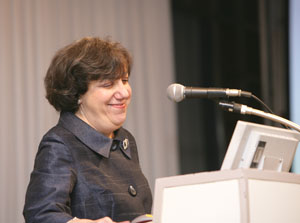 I would like to switch to another topic now. You already heard it once or twice this today, and that is that we all have a new challenge. We have countries that have an aging workforce. This is a term that is used everywhere. Now, I personally do not like that term aging workforce, especially since I am going to be turning XXX years old tomorrow. Not going to tell you how old. You can guess. But my birthday is tomorrow and I am becoming more and more part of that aging workforce.
I know back in the States, I can stand in front of any audience and I can tell the managers in that audience that even if they never hire a person with a disability, I can guarantee in writing that if they have the same people working for them 10 years from now as they have right now someone will become disabled, someone will have a heart attack, someone will be in a car accident, someone will be diagnosed with cancer, someone will come back and turn to their boss and say, "I need an accommodation."
If we are smart managers and leaders and really moving our countries forward and really doing something to make sure that we are the most profitable countries in this world, then we need to make sure that we do not throw away our talented employees because they become disabled. If we understand how to accommodate, they can stay on board. This is bigger than just a disability issue; this is a management issue. The more you can understand how to accommodate the better you will be to keep the talented people you have on board for as long as you need them. So understanding accommodation is just good business.
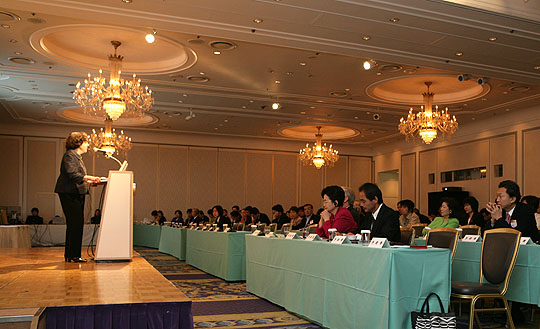
Let me talk about something else that we spend a lot of money out in the United States and that is workers' compensation. I am sure you have a similar program here. When someone gets injured on the job and they cannot stay on work all time, you send them home. I say, "let us accommodate them." So we bring them on back. We learn how to accommodate them so they can stay part of our workforce. Couple of years ago, I had a woman come into my technology center, because we realize it cost about $29,000 for someone to sit at home. It cost me about $500 to accommodate them and bring them back. Good business.
So this person came into my technology center. She came in and she was very sad. She was in a massive explosion at work. She does not give us eye contact. She sits, she stands, and she bows her head and she says, "I do not think you can help me. I do not think there is anything you can do, but I heard about your program so I came." We said, "Come in." Because of this injury she no longer has hands. She was badly burnt. They were literally burned off. So we showed her the technology that you just saw, the kind that you can talk to your computer.
We showed her and she gets a little excited. She goes,"Can you do emails like this?" And we said, "Sure, you can." She gets a little more excited she goes," Can you use your voice to do word processing?" We go, "Of course." She gets even more excited, "Can you use your voice to go on the web," as you just saw. We said of course and we go, "Where do you work?" She goes, "Army." So we go "www.army.mil" and offered pop right up. She gets even more excited and then she got little sad again. She says," I am an accountant where we work with spreadsheets. Can I still have a job?" We go, "Yeah, pull up excel, start to fill out." She gets so excited. She turns to her husband and goes, "Mike, I will be able to do the check book again. Thank God, because you made such a mess of our checking account."
Now we do not call her our workers' compensation claimant. We call her our Pentagon survivor, 9/11, second day on the job. Did not know how to leave their building? 70% of her body was burned. You do not throw away people. You make a difference. You accommodate. That is what we did.
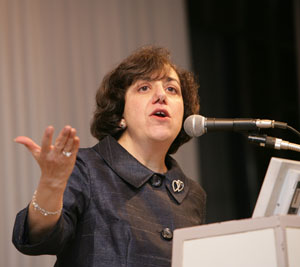 Let me talk very quickly now of how the model of providing a government, a society, an infrastructure that includes people with disabilities can have an impact because we have CAP, because we have the Americans with Disabilities Act, because we have the ability to do this, we have been able to bring back our service members. We are able to bring them back and accommodate them. I put together a program called from deployment to employment which allow me to accommodate the most severely service members. When I was young, I used to protest the laws. Now, I just change them. We change the law that allows me to provide accommodations to service members, and they can even keep it after they separate from active duty.
The young man in this picture that I am staying next to when I first met him he was badly burnt and could not walk. He was one of the ones that got to go the Texas Ranger game. He has no arms. He walks with difficulty, but he got to go to the game. When we think of accommodations, we think of how we can help all of them. The picture on the top is a young man. He was on ABC News, because he was at war and he was attacked by one of those IEDs. He cannot walk. He cannot talk. He cannot use his hands, but through the use of technology, he gave the speech with the Sergeant General of the Army at its 200th celebration. Make a difference. Learn to accommodate. That is what it is about.
Here is another gentleman. This young man in uniform is Captain Smiley. He got promoted. You can see how proud he is to wear his uniform. He is currently getting his MBA at Duke. Once he completes his masters, they expect him to go on to West Point to teach. That sounds pretty cool. What makes it an interesting story is that Captain Smiley has no eyes. Captain Smiley's eyes were lost at war, but he learned to use technology, make a difference, learn to accommodate, have them part of your work force. We would be a fool not to have Captain Smiley as one of our brightest and our best.
We do a lot of programs and all the services have special programs to help with transition. We have programs to help with the reemployment because after all, like you, one of the things we usually do when you meet new people you say, hello. You give each other your names. You give each other your business cards, and you say what do you do? In our society, work is part of your identity. So we want to make sure that we have the ability to bring back our soldiers, our sailors, our airmen, our marines to work and to be part of our society no matter what they have lost at war.
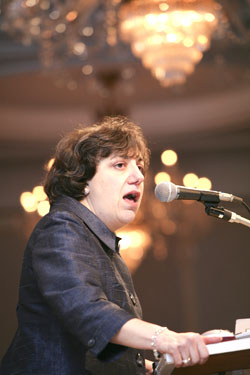 Here is my web site. I invite all of you to visit and learn more about the things I have mentioned tonight. How we can make a difference. Here are some more resources. People will say, "Well, that sounds great, but you know I do not remember everything that a woman said." So here are some other ways in which you can learn about how you can make a difference. How you can start to develop a law that makes sure that you include everyone in your society. How you can bring back your people who may have been sick or injured. How you can make it all happen. It is really your challenge, and here is your opportunity to make a difference.
So in conclusion, we have the opportunity, you have the opportunity to make a difference. With the tools and technology you can bring people with disabilities, the young into the workforce. You can accommodate your coworkers who have become disabled. You can make a difference for those who become injured, however they may become injured. You can change the world. You can have a universal society. And I challenge you to do so. Thank you very much.
(Takenaka) Thank you very much, Ms. Cohen.
(Cohen) I would like to take a moment if you do not mind and invite Nami to come up to the stage. It is a military tradition to give your coin, and you give it to people who have shown excellence. I believe Nami has shown a unique level of excellence in the area of disability and universal design. Please accept my coin.
(Takenaka) Thank you very much. That was a wonderful presentation, and thank you for the coin. Thank you so much. I really appreciate it.
Mr. Ishiba, Minister of Defense, has arrived and he is actually the Chairman of the Universal Society Diet members committee and you might not know this, but I was invited to that meeting of the parliamentarians on realizing a universal society. Mr. Ishiba said that he had visited DoD many times, but he was not so much aware of the activities by CAP. So he is with us now.
Part2: Panel Discussion
Ms. Dinah F.B. Cohen (Director, Computer/Electronic Accommodation Program (CAP),
The U.S. Department of Defense)
Mr. Shigeru Ishiba (Defense Minister)
Ms. Toshiko Hamayotsu (Deputy Chief of New Komeito)
Ms. Mitsuko Ohira (Lawyer)
Mr. Takashi Kiriku (Senior Managing Director, Nippon Keidanren)
(Takenaka) Please refer to the program for the participants in the panel discussion. I am going to call upon each one of the panelists in a short while. Also after this panel discussion, we are going to or I am going to read out this draft of the Basic Act for building the Universal Society and that is on this yellow sheet of paper. I am going to ask the panelists to talk about their views and thoughts on universal society from their experience in their daily lives, how they wish to really capitalize on the universal society that they are trying to realize. So that will be the theme of the panel discussion.
Mr. Ishiba, the Minister of Defense, please come on stage. Ms. Toshiko Hamayotsu, leader of the Universal Society Project Committee and I am sure this person needs no introduction, but she wrote the famous book, my closest friend Ms. Mitsuyo Ohira (lawyer). Actually, Ms. Ohira has a baby daughter and she is here with the baby and her husband, but they have just stepped out for just now. Now also we have Mr. Takashi Kiriku who is Senior Managing Director of Nippon Keidanren, the supporter of this symposium. Also, we would like to ask Ms. Cohen to be at that table on stage as well.
Thank you so much for participating in this panel despite your very busy schedule. It is a wonderful symposium already, thanks for your presence and we hope to make it an even greater success with your contribution. First of all, as I said already, we are trying to form a society where everyone supports everybody else as well as the society as a whole, that is the notion of universal society. And I would like to hear your views on universal society, how you wish to utilize that in your day-to-day work and life, maybe five minutes each for you to speak first and then if you have any questions to Ms. Cohen you could ask the question as well. Ms Hamayotsu, you go first.
(Hamayotsu) Good evening, ladies and gentlemen. As introduced, my name is Toshiko Hamayotsu. I have been 15 years since I became a politician. Before that, for 20 years I was a lawyer. I was practicing law and during that period the ADA law came into being in the United States. Even before the ADA law there was a Rehabilitation Act and what was most shocking to me was the difference in philosophy between the US and Japan.
I really wished we had such an act or law in Japan to make a difference in the society, and when I became a politician I was determined to really tackle this issue. But having said that, even when I try to call for other supporters to realize universal society, many people did not know exactly what I was talking about. What is a universal society was their first reaction. So I really started alone waving this flag of universal society. I am trying to remember something. I felt like Don Quixote, Don Quixote waving the flag of universal society alone.
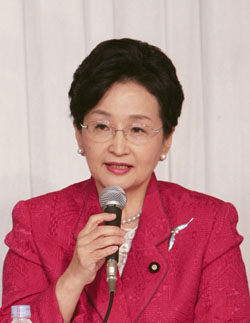 That was some years back, but 10 years ago I got an opportunity to meet with Nami of Prop Station and I was taken to the site of their activity. In the US, Patricia Wright was the pioneer who led this enactment of the law ADA. Namine, or Nami is like the Patricia Wright of Japan. I really thought so when I met her first. So I felt, "Oh, I am not Don Quixote anymore. I can realize this and make it happen," and that was 10 years ago, already 10 years have passed.
In the beginning I felt like giving up, and frankly speaking that happened. However, with Nami's warm support, I took baby steps and was able to come this far because I wanted to really create a society in Japan where people can live a humane life and a happy life by supporting each other. That is the kind of society that we are trying to realize.
We have this bestselling book that talks about the future of Japan and deals with class and envisioning a society that has a high standard of caring for as well as taking care of other people. People who are compassionate, caring for other people, these are the people of integrity. So just like people, we have to create a country or society of integrity. Integrity does not come with economic might, rather it comes from within the individual, regardless of any challenges or disabilities that they may or may not have. Regardless of that, we need to have a society where everybody can lead their lives the way they want in a positive manner. I think that is a society that we can say really protects the human rights and really respects human rights.
So I am no longer Don Quixote, I am no longer alone, and I really want to step further to make this a formal law. Once we have that law, the reality of society will come with it. That is my thinking. I do not believe we are in a universal society yet here in Japan, but by bringing this law into effect we may be able to drastically change our society into a society of integrity. Thank you very much.
(Takenaka) Now we have on stage my closest friend. Mitsuyo, Mitsuyo Ohira. I have asked the panelists to speak for five minutes about their views on a universal society. So will you do that?
(Ohira) Thank you. Sorry for being late. I was here earlier but my baby drooled on my clothes and I had to clean up.
When I first met Nami, I was in the Osaka local government. The first day I met her, I fell in love with her. Like the TV program on matchmaking it was almost like love at first sight, and the notion of calling disabled people challenged people instead of disabled encouraged me greatly. We are born in this world to this society and we have every right to really shine and lead a meaningful life, regardless of whether or not have a disability. So I was very much impressed and I have been a close friend of hers.
I went back to practicing law and I had a baby a year and a half ago. She has Down syndrome and is challenged. The doctor told me he did not know for sure how serious it was after she was born and the first person I called was Nami. I talked to her on the phone and said, "she is a baby born into this world and I want her to be able to be a productive member of the society." There are tests that you can perform during pregnancy that can show whether or not your child has Down's Syndrome and you could decide not to give birth to your baby. This option of abortion however is equal to wasting life, and there is no life that should be wasted which is why I am happy to live my life together with my baby.
I also looked at Rie Kubo's picture book and was very much impressed by her artwork. I was sure that her mother, the writer, must have gone through a lot of hardship in the past and this moved me very much. When I show this picture book to my baby daughter she points to the picture and asks me, "What is this mom?" So I was really thinking that I hope some day my child will also grow and be able to accomplish things such as this. These are the things that a society need to keep in mind in order to help the challenged as well as their families lead a meaningful life. This is a task that we need to address together. I think it has been about 4 minutes and 55 seconds, were you counting? Wow. Impressive.
(Takenaka) Thank you very much. That was Ms. Ohira. Yes, I could hear a baby. Mr. Kiyoshi Kawasita, her husband, and Haruka the baby are also here in the back row. Please give a big applause. Yes, I visited your house the other day and Hakura is such an active baby with a stare that I think she gets from her mother. Now, Minister Ishiba if you would please.
(Ishiba) Thank you very much. Good evening, ladies and gentlemen. Well some of you may wonder, that since we are talking about something outside of defense issues, why I am here.
Well when I was in my fourth term as the parliamentarian, I was the Head of the Transportation Committee, and back then the law for a so-called barrier free society without any steps in the streets and so on was under debate. I am from Tottori City of the Tottori Prefecture, which contains many elderly people. In train stations however, there were only staircase that lead to the tracks and these elderly people were forced to use the stairs because there was no elevator. This can be difficult on the aged people which led to a debate on building an elevator or escalator. For me, that was beginning of the transport committee looking at a so-called barrier-free society.
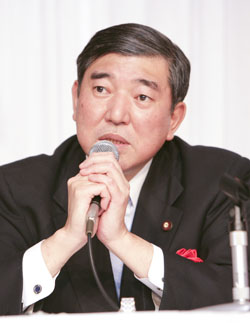 We tried for ourselves to see how difficult it would be to get to the Shinagawa Prince Hotel from Shinagawa station in a wheelchair and the committee members including myself, actually experienced firsthand how it feels and how difficult it is to commute on train. Getting on the train alone was difficult enough, and after arriving at the station you had to go through so many, many steps just to get out. I felt to myself that it was impossible to reach the final destination, which ultimately was the hotel. So that was the experience that I went through before we formed this committee for the parliamentarians promoting a universal society or a barrier-free society. The core members of the Universal Society Committee are the members who were involved back then, including Ms. Moriyama from Hyogo Prefecture. She was very active in this endeavor, and thanks to such efforts we have made the forward progress that led me to the opportunity to listen to Nami's speech and also learn about DoD. I knew vaguely that DoD was doing something like this, but I did not really know what exactly was undertaken by the program run by Ms.Cohen. It was only after hearing about it that I saw clearly the sharp difference between the US and Japan.
A lot of people might not say good things about the United States but all in all, the US is a great country. Why is it great? Because I read this in Nami's book, that every American can lead a life that they are proud of. That is really the beginning, that is the first step of national defense. I was very much impressed because America is a society where everyone can take pride in their lives. America is a strong country. Sometimes people think the US uses its force in a wrong way. That is one criticism, but aside from that how can you implement leading a meaningful life in which everybody can feel worthy of living. Just saying it might be easy, but doing it and acting on it is whats really important, and that is the difference that the United States has made. That is what is great about the United States.
In Iraq and Afghanistan, many people have been injured and damaged in different ways, but within DoD they are given opportunities. This is very much like America where equal opportunity is provided. So with that in mind we need to think about what we can do. Maybe a slight few of you have had the opportunity to be on a fighter jet. It is really tough because it is much different from a typical passenger aircraft. The pressure changes drastically and then there is the effect of gravity, the great G. Not a lot of people are capable of passing the physical tests required to become an F15 pilot, I was one of the few. I guess I just like that sort of stuff, but anyway you will have to experience it first hand to really know how difficult physically it can be. With 7 or 8G of gravity and the pressure dropping so drastically, you can barely move your body, if at all.
Mach 2 , I believe that is the speed in which you cannot see or hear things. It is in these situations that your ability to maneuver your fighter jet determines the outcome of your life. With that in mind what are the kind of technologies that you would need to develope being mostly without the abilities that you would normlly have. Under pressure and without sight of hearing, these are the circumstances under which they have to fight. With the national interest of the United States at stake, advanced technologies have had to be created to deal with situtaions such as these and it is with the contribution of these technologies that they are able to bring a closer realization of a universal society. Back then, that was my understanding of this point of view. We looked at the nation and we tried to see the integrity of people as mentioned by Ms. Hamayotsu. This sense of value is what we have to bear in mind at this moment. This is something that we have learned from Ms. Takenaka. We have learned from what she says and we have learned from what she wrote. Allow me to use this cliché, but this is an eye opener necessary to create a successful society, and in order to establish a good country we have to make sure that each and every one of us should be proud of ourselves. So there is a clear connection between being proud and the creation of a universal society and the protection of our country. That is all. Thank you very much.
(Takenaka) Thank you very much Mr. Ishiba. I am sure many of you are really surprised to see him in this kind of a forum. Now we would like to ask Mr. Kiriku to say a few words of the opening from Keidanren.
(Kiriku) Thank you very much for your introduction. I would like to speak now about the industry's viewpoint of employing the disabled or challenged. There are two things. First is of the benefits it would provide for these challenged people. Whether they are employed or not, just the option alone would make a tremendous difference in their lives. So how we can provide employment to these people will be a very important factor, especially with the decrease in our working population. We use the term 'part timers'. We see an increasing number of youngsters who do not take up jobs, but rather just continue working as part timers. Also we have a low percentage of females in the workfoce who have permanent jobs. So with this being the case, we should make sure that the permanent job can be provided for all people.
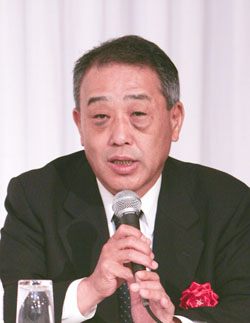 Going back, there was a vision provided by the Keidanren, which is entitled the 'Country with Hope'. The prerequisites for that was the proposal to establish the country with the participation of all its people, and I do believe that this is a society with coexistence. I think there is a clear linkage between the two things and so we have to cover all the people, young people, old people, the female population, and also people with disabilities. It is up to us to provide the opportunities of employment for all these people.
I believe that the major trend here is related to what you are doing. Work life balance is of the essence. We try to strike a good balance between our work and our life and the fact is that many people have different needs and requirements for their work. So each individual have different views as to how they want to work and we have many organizations, such as the private enterprises or other organizations, that can accomodate them. So we all have to be prepared for a diversified way of employment, a diversified way of working. Many people might work as regular employees and some people might work as irregular employees. Some people prefer working in an office while others prefer working outside. Some people might want to work through IT and so on so we have to try to accommodate these needs, different diversified needs, and I certainly say that it is a challenge to include the participation of all the people.
Last year in the middle of the December, we came up with a charter for the work-life balance, so it is now high time for us to start working really hard to establish a society with a work-life balance. In that respect this is a good opportunity to incorporate the challenged into the workforce.
One more thing relating to the legal issue. Back in 2006, there was a law established for normalization. This law calls for assistance to bring about independence of people with disabilities. However we cannot support them all the time because this could lead to the increased burden for other side of the PWDs. In regards to employment, we can see an increasing trend of PWDs joining the workforce among private enterprises.
At this point we have a bill being discussed at the National Diet and one of the main topics related to it are shorter working hours in employment. We should be able to incorporate the disabled workforce into those shorter working hour required jobs. With regards to the working of shorter hours, which is the working of between 20 and 30 hours a week, we could incorporate a 20 hour work schedule for people with disabilities, but it is of utmost importance that we accept those people who have shorter working hours. Some people with disabilities may only be able to work for a short amount of time or only a few days out of the week. If it is in line with their wishes then it should be possible to include them into positions that these companies can provide for them.
In some cases however, it may be difficult for companies to provide this kind of opportunity. For example chain stores or other buisnesses in the service area may only provide a set work schedule or require a strict set of duties. A tax that penalizes those companies that do not have the necessary number of disabled people in their workforce is becoming a major trend in society and is favorable towards those with diasabilities who seek employment.
It is very important to have a broad understanding of the participation of all the people in society and please note that you have the support of the industry as a whole. I am sure that there will be many problems that you will face in the future, but we would like to make sure that we can join hands with the people who are present here in trying to reralize what I have just explained to you. This is the standpoint of the industry. Thank you very much for listening.
(Takenaka) Thank you very much Mr. Kiriku. That was a very encouraging remark on behalf of the industry and I will be very happy to listen to all the hot remarks from all these people and the implementers here in this area including the secretaries or the deputy secretaries in this room. I believe our next speaker is Zaniya-san... yes, since Zaniya-san is here we would like to ask him to speak about this issue. He is from the Ministry of Education and Technology. We talked about the importance of education, so we would like you to make a comment as a person representing the administration regarding education.
Please come up and please use the microphone here. I am sorry to ask you to come up and speak so suddenly. This is a precious opportunity. Thank you.
(Zeniya) My name is Zaniya. I am the Vice Minister of the Ministry of Education and Technology. At this symposium for the Realization of a Universal Society I was able to listen to all the panel members, and I would like to speak about what we do from the stage of education. For two years we have worked on the restructuring of the institutions and the systems. We decided to introduce 'normalization' - a concept which entails providing education. That was a background for the changes.
In the past we have had special schools for the blind, for the deaf, and we decided to change the name of the schools that required special assistance. We also decided to provide education for people with developmental disorders in elementary and junior high schools.
One more thing is the importance of coexistence. We need to make sure that we can provide a pro-active learning environment that can allow children with and without disabilities to be able to collaborate equally among themselves.
So here this symposium is meant for the realization of a universal society, and I was able to learn a great deal from the presentations here today. I am sure I will be able to listen to many other remarks from the panel members as well, and I am looking forward to that. Thank you very much.
(Takenaka) Thank you for speaking on such a short notice.
At this point we would like to ask Ms. Dinah her thoughts. Ms. Dinah would you come up and share your comments or ask any questions that you may have for the next two or three minutes.
(Cohen) Thank you Nami. I think the biggest comment that I would like to add after my presentation was to reinforce the concept that we have the Americans with Disabilities Act, and many, many businesses were very, very nervous and concerned about the impact that ADA would have on them, and many employers were very concerned that they would lose money and it would cost them too much money to employ people with disabilities. We are almost 18 years from the passage of the ADA, and more and more managers and business will say that they did not spend hardly any money to accommodate people with disabilities compared to the revenue they got for having them part of the staff.
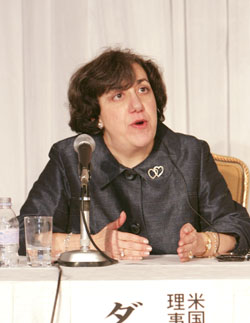 I think the challenge or fear that many managers will have is that it is going to cost them too much to employ them. And time and time again, and study and study again, the cost of accommodations is usually less than 500 dollars. They usually have less absenteeism. They usually have a lower turnover rate and many organizations for example, Walgreens was just highlighted in our news that the division that had the highest number of people with disabilities end up being the most productive distribution center.
So I think that we all come away with fears that it is going to be harder to do than it really is going to be. And one thing I want to reinforce is that if you have a built-in, it is almost like the field of dreams movie. If you build it, they will come. If you build a society that really includes people with disabilities, you are really taking care of not them but us, because if we all live long enough we will all be people with disabilities. So it is really more about us than about them. It is time to make a difference. Thank you.
(Takenaka) Thank you very much Dinah. So based on the comments just made and other things as well, if you have any further comments from the panelists not 5 minutes this time, but maybe starting the other way around. Mr. Kiriku you go first, 3 minutes please.
(Kiriku) As Dinah said, the will of the enterprises s to hire people is very strong. They are looking for a lot of people with different skills and in trying to do so with regard to the disabled unlike before, the social responsibility of enterprises is very much emphasized and so many companies are really having a stronger will to hire and accommodate people with challenges. The biggest problem I think, and this is not limited to disabled people but highly qualified and skillful people as well, is the challenge in training them. To foster them further, that is the biggest challenge because you cannot get a good job unless you have a certain level of skills. Just because you graduated from a good university does not ensure you a high salary. With a salary dependent on your personal skills and capability, the biggest challenge that we face for disabled people is how can we train them to assert themselves into our workforce. This is a practical issue that we here to address and it is this and many related issues as well that people are struggling with.
In various forms, people are trying to raise their skill level while they are still working. For the challenged as well, we need to think of a similar way to enhance their skill level. This may mean additional cost for the employers as well as its disabled workers, however we need to take steady steps in order to bring about these changes.
We have various facilities that support challenged people and we need to increase the opportunities for them to raise their skill levels. On a trial basis we want to offer work experience opportunities so that they can do just that and I think that is something necessary for normalization. When I was in the United States, over ten years ago, I could sense that they had a society with this kind of supportive environment. There was an air about it that really enabled that reality. I feel we need to develop something like that in Japan as well. Thank you.
(Takenaka) So within corporations, I agree that the challenge for the individual is how to increase their skill level in order to really be able to fulfill his or her capacity. I really express to you this point because the unique attributes of individuals has to be further developed in order for them to make the best of what they have. Just like in the case of Rie Kubo, it was with her families support that made her creation of a picture book possible. I can not agree with you more that skill enhancement must come first, and how we broaden our horizon on these opportunities is really important.
Okay so next is Ohira. You have a baby daughter who has a bright future doesn't she.
(Ohira) Lately I have been constantly thinking about what is a disability. The so-called challenged or disabled people cannot do some of the things that other people can do. While this may be true, even people who are healthy physically connot do things that other people can do. People with a physical disability are labeled handicap. However, while they may have a disability it does not mean that they are disabled. The problem really lies in the minds of the people who label them this way.
So although the audience today may not have any discrimination in their minds, this is unfourtunatly not the case in our entire society. So we have to really have a different mindset, a reform of how people look at disabilities or the differences that we have in each of us. It is a long standing value set that has been with people for so many years that I cannot expect them to change overnight. I know there is a gentlemen here from the Ministry of Education and allow me to say that I hope that children in schools will be taught that there are people of different personalities, different capabilities, different physical attributes, and with that understanding I hope that the children in Japan can grow to become aware of this. I hope that the younger generation who are still flexible in their thinking can recieve an education that really encourages an awareness within themselves, and I think that the sound upbringing of children in this way will lead to a happy life for the adults as well. Thank you very much.
(Takenaka) Yes, by the time you baby Haruka grows up, I hope we will have a wonderful universal society. Ms. Hamayotsu, please.
(Hamayotsu) Yes, in 2003 we started this ruling party PT to create a universal society and we have had this resolution to create a universal society.
We have gained momentum over the past years, and two years ago in summer of '06, a professional singer from Sweden named Reyna helped us with our commitee for the development of a universal society. She sang for us in her beautiful voice but not only is she a singer, she is a painter and writer as well. Both of Reyna's arms are missing and one of her legs is half the length of the other and although she has quite a disability she still stated the following: "I am happy now that I was born with disabilities and I am happy that I was born as a Swedish citizen because since my childhood, my parents have told me 'you have different values than other people. You are different, you are unique, and therefore you can be yourself'." Her parents nor the people around them did not discriminate against her at all.
With that being the case, being born with a disability is not a source of unhappiness, but the question is to which country you are born in that really makes a huge difference. I really want Japanese people to be able to say that, 'Oh I am happy that I was born in Japan. I may have been born with a disability, but thanks to that disability I now have depth in how I feel for other people and for people as a whole.'
We conducted an international survey the other day about disability and in Germany, 81% of the population with disabilities claimed they did not feel discriminated against whereas the number in Japan was only 18%. Only 18% of the challenged in Japan said that they are not discriminated against so the figure really tells us something. In order to realize a truly universal society, we have to really narrow the gap between Germany for instance, and Japan.
In Japan it is usually the case where the disabled had to really suit themselves to the rest of society, but actually it should be the other way around. In other words, the society has to really make changes so that they can coexist well with people who have disabilities so that we can live together and create a new society together. That is the philosophy on which we are trying to develop and the drafting commitee has come up with this the core principal in their draft law on realizing a universal society.
(Takenaka) I am planning on reading this draft at the end of the symposium.
(Hamayotsu) I was going to read out the draft for a universal society and although I still have time, I will leave it to Nami to mention the details. These are the philosphies on which we are trying to address. Japan is faced with so many challenges in its economic arena as well as demographics such as aging and lower birth rates, family issues and so on, but I think the roots for these issues are the same. In other words we want to, or rather need to change our society for the better, that is the base concept of the Universal Society Law and we would like to enact this law as soon as possible.
A good society is one that allows people with or without a dissability or weakess to live easily. I think we are moving forward. We have come a long way and have made concrete improvements towards the formation of this law and I would like to be a continuing part of this momentum in creating a truly universal society. Thankyou very much.
(Takenaka) That was Ms. Hamayotsu. I have worked together with many people in our efforts to realize the universal society and in January of this year, a Social Security Citizens' Committee was formed by the Prime Minister and I am continuing with that activity today. Mr. Tatsuya Ito who is also member of that committee is here. Can you stand up to be recognized? That is Mr. Tatsuya Ito.
Thank you very much. We will hear from you on a different occasion. Next, Minister Ishiba, you will be giving your comments for the next three or four minutes. You are the last speaker but please share your thoughts with us.
(Ishiba) It is important that this law be based on significant ideas containing high philosophic reasoning, but in reality these ideas have to be based on practical benefits otherwise they can never be accomplished so what we have to discuss is what those practical benefits are. In the US for instance, people in the service who have lost their vision are still able to continue working in various positions and are still able to gain a higher level of knowledge. If he instead decided to leave the service, then the government would have to provide for the soldier's well being in some way or other so that is the practical side of one such scenario.
You might not like that kind of argument about the practical benefits and drawbacks, but it is something that we cannot avoid discussing.
Although I am not certain, it is my understanding the Disney affiliated Tokyo Disney Sea Park does not provide discounts in any way to the physically challenged. You might argue that 'well other parks give discounts', but Tokyo Disney Sea's explanation for this fact is that their park is designed for everyone to enjoy regardless of whether or not they have a disability.
Hospitality is another ideal factor involved in the sculpting a society. It is in poor taste to associate discounts with disabilities. I believe that the restructurizing our community to accomodate those who are challenged is more important. For example a walk way without any steps is ideal for people in wheelchairs however, without a curb linning the street, cars would be less restricted to staying off sidewalks which at some times might endanger pedestrians.
Considering the visually impaired, while our train stations have braille blocks linning the edge of the tracks to warn those without sight of an edge close-by, these can sometimes be a hinderance to people in wheelchairs so a universal design is not easy to envision.
I talked about this experience of riding in a wheelchair and about how people don't realize how easily you can tip over. I think hospitality has to start with education. In our LDP Committee, we often talk about the need to teach children about the difficulties that disabled people are faced with, especially the visually impaired. The eye-mask for example is one of the tools we can use in order to create empathy among children toward the visually impaired people. By letting them experience this for themselves will lead to a better understanding of the importance of hospitality. In a perfect society, the knowledge of hospitality would take precedence over all other academic subjects. It is meaningless to enter a good university or company if one does not possess or does not grasp the basic principles of hospitality.
The Ministry of Education has been stressing the importance of the need for a more relaxed education policy in order to create time to learn a more hospitable mannerism. Although I am not sure that this is still their mindframe on this subject, I didn't understand how they could fit such a lesson into an already crammed class schedule. Pointless as well would be the offering of these lessons during a free period, if participation would only be optional.
I talked about the officer in United States and I am embarrassed to say this but at this point, the employment rate of the disabled is 2.1% which is beyond the level required for the people. Still the uniform people are excluded from this calculation so we are talking about the calculation of 2.1% based on the people without uniform, the civilians. With the introduction of high technology we could change this situation.
Although I may be criticized for saying this, I believe that the Defence Ministry of Japan could assign individuals with disabilities to positions including those such as self-defense official. I don't see anyone from the Defence Ministry attending this symposium but still it is important for us to include the jobs of those in uniform to this equation. It is time for us now to learn from the situation in the United States. Thank you very much.
(Takenaka) Thank you very much Mr. Ishiba. I am very happy and very much encouraged with your remarks and thank you for sharing with us your thoughts on this. Ms. Hamayotsu met with Ms Reyna Maria who is the gospel singer from Sweden. She was disabled with no hands and shortened legs, and we are now able to see a very good example of the difference in attitudes outside of Japan. Within Prop station we have been able to introduce to you many good examples from abroad, but it does not mean that this is only possible because of the fact that they are outside of Japan. It is not, and it is very important that we bring these attitudes and way of thinking here to Japan. I am quite convinced that Japanese people are warm people, warm hearted people and we are sure to be able to learn from the experiences from outside. We are able to learn and we are capable of going above and beyond the policies of foreign countries. That is the reason why I am asking all the people who are present here to work on this goal. We would like to confirm and reveal the fact that it is possible for Japanese people to do what is necessary. Ms. Dinah thank you very much for your participation. You have listened to the remarks by all the people and I would like to invite you now to close this session with a remark of your own. Thank you.
We would like you to give us some encouraging words for all the people in Japan.
(Cohen) I am just so thrilled to be with all of you, and I believe that between this declaration, this draft, and the very bright, energetic, passionate people here today, you can make a difference. You can move forward into making this country much more inclusive of people with disabilities by starting with education, giving them the training they need, to be the employees of the future, to be the change agents, you have that power. I invite you, I ask you, I challenge you to join us in having a much more universal society. I wish you all luck. Thank you.
(Takenaka) Thank you very much for your very encouraging remark. At the end of this symposium, we would like you to refer to our declaration which is located on this yellow sheet of paper. Dinah-san, yours is in English. I would like to read to you now the Basic Law of our declaration on the realization of a Universal Society.
-Declaration Draft on Realization of Universal Society-
Many people say that we do not have any future in Japan, that many Japanese people are not invigorated, not in high spirit. We have disparities everywhere and we have a declining birthrate. A stressful work-place prevents us from having a good bond between ourselves and our families, or social community. In the international rankings of these bonds we are lost.
It is important to have an energetic society in order for Japan to be invigorated. In the work place, each and every member of society should be invigorated in order for them to become energetic and in order to invigorate people.
It is important to allow everybody to be able to be proud of themselves. It is important for all these people to be able to live their lives to the full extent of their abilities and personalities. It is also very important to have unified coexistence, to mutually help each one another and by doing this we will be able to establish a resilient and strong community and workplace. If you take a look at the legal aspect of this, we have basic laws for equal opportunities among both genders and we also have basic laws for disabilities and old age, but these are not comprehensive. At this point we would like to use the term Universal Society, which is a strong and kind society, in which everybody can live a good life through mutual help and mutual assistance. With an increase in the level of declining birth rate and population aging it is imperative for us to establish an environment in which everybody can live properly.
People age and it is possible for all of us to one day become disabled, for all of us to become mentally sick, so this is not just other people's problem but our own problem as well. This is about the creation of a society not only for us, but for our children so we would like to propose the establishment of the Basic Law for a Universal Society at an early stage.
Therefore, we commit ourselves to proposing a swift Draft Declaration of the Basic Act for Building the Universal Society as follows:
First: we have to invigorate each and every one of the communities in Japan by establishing an environment in which everybody can be able to exercise their ability and express their personality.
Second: in order to invigorate Japan, we have to establish a good environment for each individual so that we are able to energize the community and the workplace. Here now is Nami Takenaka, Director of the Prop Station and the Drafting Committee of the Universal Society Basic Law. So if you would, please give her a big round of applause.
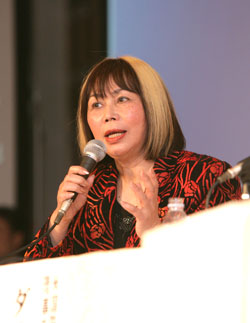 (Takenaka) Thank you so much. I would like to extend my sincerest appreciation to all of you for bringing your own thoughts and ideas. Allow me to speak for just a minute. I myself have a daughter who is 35 years old and severely disabled. She was born with very severe brain-damage and does not even comprehend that I am her mother. I am really happy to have her and it is because of her disability that I stand before you today. I am not sure that the society that we are living in right now is suitable for her. I cannot die with ease until I know for certain that she will be safe in society after I am gone. I need to make sure that we increase the number of people who would be willing to support her. We have to establish Japan, not only the country but the community as well into a society that will be willing to provide help for people like my daughter. That was the driving force of my activities. I would like to take this time now to extend my sincerest appreciation to all of you, with this I would like to close this symposium on the Realization of a Universal Society. Allow me to give you all a big hand.
Thank you. And now we would like to ask the panelists to take a group picture. Mr. Ito has already gone? If he is here, we would like him to join this commemorative photo opportunity. I think the baby Haruka and her father should also participate. Maybe Haruka might not be a very good mood, maybe this is her feeding hour. This is the first time for Haruka to come to Tokyo, oh she is just sleeping. Okay quiet, quiet everybody. Daddy, you are also invited. You digress? All right, he is a very modest person is he not? How lovely! Let us take a picture. Lets join hands. Smile. Thank you very much.
-Photo Taking-
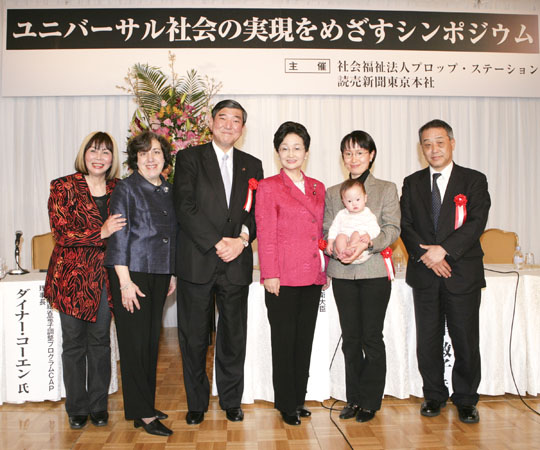
(Takenaka) Thank you very much once again. With this, we would like to close the 2008 International Symposium on Realizing a Universal Society. Thank you so much, and please have a safe trip home.
We have a reception taking place in the room right next to us. If you have already registered yourself for the reception, please follow the red line. If you have already received the red colored name card, it means that you have already registered yourself for the reception. So the reception will be the room on your right hand side. Thank you very much.
(MC) Ladies and gentlemen, thank you very much for attending this symposium. With this we close 2008 International Symposium on Realizing a Universal Society.
-Revised by Billy Jr. Ichida and Masanori Kondo
Video Clips from the Symposium |
